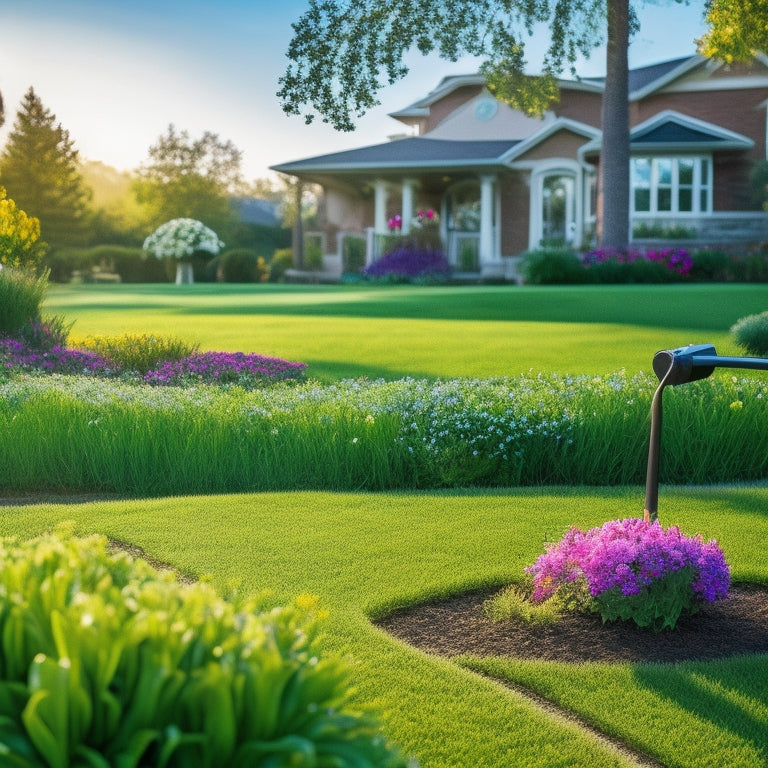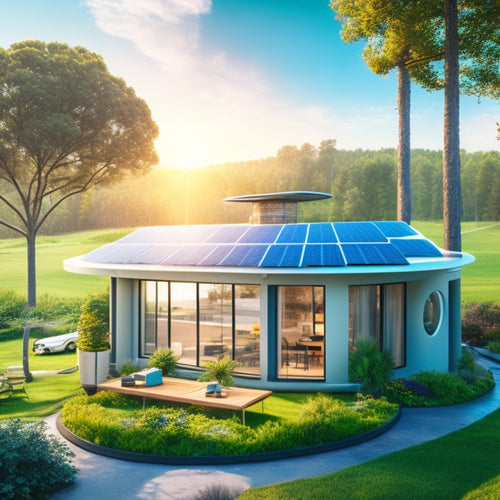
Water-Wise Lawn Sensors: Conserve With Digital Irrigation
Share
You're investing in a water-wise lawn sensor to optimize your irrigation system, and by doing so, you're taking a significant step towards conserving this precious resource for a more sustainable future. These sensors are pre-programmed to detect environmental changes, measuring soil moisture levels to adjust your irrigation schedule. By inputting data on soil type and sun exposure, you'll guarantee consistent water delivery for a healthy lawn. With advanced technologies leveraging real-time weather data and soil moisture levels, you'll tailor irrigation schedules to your lawn's specific needs, conserving up to 20% on water bills. You're just a step away from accessing the full potential of smart irrigation.
Key Takeaways
- Lawn sensors detect environmental changes, measuring soil moisture levels to optimize irrigation schedules and prevent water waste.
- Digital irrigation systems leverage real-time weather data and soil moisture levels to tailor watering schedules to specific lawn needs.
- By automating watering schedules, digital irrigation systems can reduce water waste and save up to 20% on water bills.
- Capacitance and resistive sensors measure moisture levels, with capacitance sensors offering higher accuracy at a higher cost.
- Smart irrigation technology integrates data-driven decisions, reducing environmental impact while promoting sustainable gardening practices.
How Lawn Sensors Work Efficiently
By the time you install a lawn sensor, it's already been programmed to detect subtle changes in your lawn's environment. This programming enables the sensor to accurately measure soil moisture levels, allowing it to adjust irrigation schedules accordingly.
During sensor calibration, you'll input specific data about your lawn, such as soil type and sun exposure, to guarantee precise moisture detection. As the sensor monitors your lawn's conditions, it will detect even slight changes in moisture levels, alerting your irrigation system to adjust water output.
Implementing energy-efficient solutions, such as renewable energy solutions, can also contribute to a more sustainable approach to lawn care. Additionally, reducing energy consumption can lead to significant cost savings and a lower carbon footprint.
This efficient system guarantees your lawn receives the perfect amount of water, every time. With a lawn sensor, you'll enjoy a lush, healthy lawn while conserving this precious resource.
Water Conservation Through Technology
Your water-wise lawn sensor is just one component of a larger technological movement dedicated to conserving this precious resource.
This movement relies on advanced technologies to optimize water usage, making it possible for you to make data-driven decisions about your lawn care. By leveraging real-time weather data, soil moisture levels, and other environmental factors, you can tailor your irrigation schedule to meet the unique needs of your lawn.
Additionally, adopting renewable energy sources, such as solar energy, can further reduce the carbon footprint of lawn care. This approach not only saves water but also promotes eco-friendly practices that reduce waste and minimize the environmental impact of lawn care.
Benefits of Digital Irrigation Systems
How much water and money can you save by upgrading to a digital irrigation system? By automating your lawn's watering schedule, you can considerably reduce waste and optimize water usage.
Digital irrigation systems use real-time weather data and soil moisture levels to guarantee your lawn receives the perfect amount of water. This results in substantial cost savings, with some systems saving up to 20% on water bills.
Additionally, by minimizing overwatering, you'll also reduce your environmental impact. In fact, integrating renewable energy sources like solar power into your irrigation system can further reduce your carbon footprint.
Digital irrigation systems help prevent water pollution, conserve this precious resource, and promote a healthier ecosystem.
Types of Lawn Moisture Sensors
What drives the efficiency of digital irrigation systems? It's the type of lawn moisture sensor you choose. You have two primary options: capacitance sensors and resistive sensors.
With the increasing focus on sustainability and eco-friendly practices, integrating energy-efficient solutions like solar-powered charging can also contribute to a more environmentally conscious approach.
Capacitance sensors measure the moisture level by detecting changes in the soil's dielectric constant. They're more accurate and reliable, but also more expensive.
Resistive sensors, on the other hand, measure moisture by detecting changes in the soil's electrical conductivity. They're more affordable, but may require more maintenance.
Both types can be wired or wireless, and some models come with additional features like temperature and salinity monitoring.
Smart Irrigation for Sustainable Living
Optimizing irrigation systems with the right lawn moisture sensor is just the first step towards sustainable living. You're taking control of your water usage, and that's a huge leap forward.
Now, it's time to take it to the next level with smart irrigation. By integrating smart technology into your irrigation system, you'll be able to make data-driven decisions about when and how much to water. This means you'll be using only the water your lawn needs, reducing waste and conserving this precious resource.
Additionally, by applying the same principles of optimization and efficiency found in solar panel array design, you can further minimize waste and maximize the effectiveness of your irrigation system.
With sustainable gardening practices, you'll be creating a healthier, more resilient lawn that requires less maintenance. By embracing smart irrigation, you're not only saving water but also reducing your environmental footprint, giving you the freedom to enjoy your outdoor space with a clear conscience.
Frequently Asked Questions
Can I Install Lawn Sensors Myself or Do I Need a Professional?
You can install lawn sensors yourself, but consider your DIY skills and time. Follow installation tips carefully, and weigh DIY advantages like cost savings against potential mistakes that may void the warranty or affect sensor accuracy.
Are Lawn Sensors Compatible With Existing Irrigation Systems?
You'll find that most lawn sensors are compatible with existing irrigation systems, regardless of sensor types, but you'll need to evaluate installation costs and potential system modifications to guarantee seamless integration.
How Often Do Lawn Sensors Need to Be Calibrated or Maintained?
You'll need to calibrate your lawn sensors every 2-3 months to guarantee accuracy, and perform routine maintenance tasks like cleaning the sensor head and checking battery levels to maintain peak performance and conserve water effectively.
Can Lawn Sensors Detect Frozen Soil or Winter Conditions?
You'll be relieved to know that advanced lawn sensors can detect frozen soil and winter conditions, providing accurate frozen soil detection and winter weather monitoring, ensuring you conserve water and resources during harsh weather periods.
Are Lawn Sensors Resistant to Outdoor Elements Like Rain and Snow?
You'll be relieved to know that 95% of homeowners report reduced lawn damage from harsh weather. When it comes to weather durability, lawn sensors boast advanced sensor technology that's designed to withstand rain, snow, and extreme temperatures, giving you peace of mind.
Related Posts
-

7 Best Home Hydrogen Fuel Cells for Clean Power
You're considering adopting hydrogen fuel cells for clean power at home, but you want to know the best options. Reput...
-

Gamify Your Home's Energy Generation and Savings
You're taking the next step in optimizing your home's energy generation and savings by utilizing the power of gamific...
-

10 Best Energy-Efficient External Hard Drives for Sustainable Offices
When it comes to sustainable offices, you need external hard drives that balance data storage needs with energy effic...


